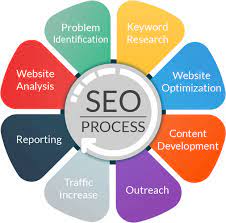The Basics of SEO: A Beginner’s Guide
Search Engine Optimization (SEO) is the practice of enhancing your website’s visibility on search engines like Google. By implementing SEO strategies, you can improve your website’s ranking in search results, attract more organic traffic, and ultimately grow your online presence. If you’re new to SEO, here are some fundamental concepts to help you get started:
Keywords
Keywords are the phrases or terms that users type into search engines when looking for information. Conduct keyword research to identify relevant keywords for your website. Incorporate these keywords strategically into your content to improve your chances of ranking higher in search results.
On-Page SEO
On-page SEO involves optimizing individual web pages to improve their search engine rankings. This includes optimizing meta tags (title tags, meta descriptions), using relevant headings and subheadings, incorporating keywords naturally into content, and ensuring a user-friendly website structure.
Off-Page SEO
Off-page SEO refers to activities conducted outside of your website to improve its visibility and credibility. This includes building backlinks from reputable websites, engaging with social media platforms, and creating high-quality content that attracts external links.
Technical SEO
Technical SEO focuses on optimizing the technical aspects of your website to enhance its performance in search engines. This includes improving site speed, ensuring mobile-friendliness, fixing broken links, creating XML sitemaps, and implementing structured data markup.
Content Quality
High-quality content is crucial for effective SEO. Create informative, engaging, and valuable content that addresses the needs of your target audience. Regularly update your content to keep it fresh and relevant, and encourage user engagement through comments and social sharing.
User Experience
User experience plays a significant role in SEO rankings. Ensure that your website is easy to navigate, loads quickly across devices, and provides a seamless browsing experience. Optimise images and videos for faster loading times and use clear calls-to-action to guide users through your site.
Monitoring and Analysis
Regularly monitor your website’s performance using tools like Google Analytics and Google Search Console. Analyse key metrics such as organic traffic, bounce rate, keyword rankings, and conversion rates to track the effectiveness of your SEO efforts. Use this data to make informed decisions and refine your strategy over time.
By mastering these basic principles of SEO and staying updated on industry trends, you can establish a strong foundation for improving your website’s visibility in search engine results pages (SERPs) and driving organic traffic to your site.
8 Essential Tips for Basic SEO Optimisation
- 1. Use relevant keywords in your website content.
- 2. Create unique and descriptive page titles for each page.
- 3. Write meta descriptions that accurately summarise your content.
- 4. Optimise your images with descriptive filenames and alt text.
- 5. Build internal links between related pages on your website.
- 6. Ensure your website is mobile-friendly and loads quickly.
- 7. Regularly update your website with fresh, high-quality content.
- 8. Monitor your site’s performance using tools like Google Analytics.
1. Use relevant keywords in your website content.
To enhance your website’s visibility in search engine results, it is essential to use relevant keywords strategically within your website content. Conduct thorough keyword research to identify terms and phrases that align with your target audience’s search queries. Incorporate these keywords naturally into your content, including headings, paragraphs, and meta tags. By using relevant keywords effectively, you can signal to search engines the relevance of your content and improve the chances of your website ranking higher in search results for those specific terms.
2. Create unique and descriptive page titles for each page.
Creating unique and descriptive page titles for each page is a crucial aspect of basic SEO. Page titles serve as the first impression for both search engines and users, conveying the content and relevance of the page. By crafting titles that accurately reflect the content of each page while incorporating relevant keywords, you can improve your chances of ranking higher in search results and attracting organic traffic. Ensuring that each page has a distinct title not only enhances SEO but also enhances user experience by providing clear and informative signals about the content they can expect to find on that specific page.
3. Write meta descriptions that accurately summarise your content.
In the realm of basic SEO, a crucial tip is to craft concise and accurate meta descriptions that effectively summarise the content of your web pages. Meta descriptions serve as a brief snippet displayed in search engine results, providing users with a preview of what they can expect when clicking through to your website. By ensuring that your meta descriptions are relevant and compelling, you not only enhance the user experience but also increase the likelihood of attracting clicks and improving your site’s overall visibility in search engine rankings.
4. Optimise your images with descriptive filenames and alt text.
To enhance your website’s SEO performance, it is essential to optimise your images by using descriptive filenames and alt text. When naming your image files, choose relevant keywords that accurately describe the image content. Additionally, provide alt text that succinctly describes the image for users who may have difficulty viewing images or for search engine crawlers to understand the context of the image. By incorporating descriptive filenames and alt text, you can improve accessibility, user experience, and search engine visibility for your website.
5. Build internal links between related pages on your website.
Building internal links between related pages on your website is a crucial aspect of basic SEO. By linking relevant content within your site, you not only help users navigate easily but also signal to search engines the importance and relationship between different pages. Internal linking can improve the overall structure of your website, distribute link equity effectively, and enhance the user experience by guiding visitors to more valuable information. This practice not only boosts SEO but also encourages visitors to explore more of your content, ultimately increasing engagement and time spent on your site.
6. Ensure your website is mobile-friendly and loads quickly.
To enhance your website’s search engine visibility, it is crucial to ensure that your site is mobile-friendly and loads quickly. With a growing number of users accessing the internet on mobile devices, having a responsive design that adapts to various screen sizes is essential. Additionally, fast loading times not only improve user experience but also contribute to higher search engine rankings. By prioritising mobile-friendliness and speed, you can provide a seamless browsing experience for visitors and boost your site’s performance in search results.
7. Regularly update your website with fresh, high-quality content.
To enhance your website’s search engine visibility, it is essential to adhere to the tip of regularly updating your website with fresh, high-quality content. Search engines favour websites that offer valuable and up-to-date information to users. By consistently adding new content that is relevant to your audience, you not only improve your SEO rankings but also engage visitors and encourage them to return for more. Updating your website with quality content showcases your expertise in the field and signals to search engines that your site is active and deserving of higher rankings in search results.
8. Monitor your site’s performance using tools like Google Analytics.
To enhance your SEO efforts, it is essential to monitor your website’s performance using tools such as Google Analytics. By leveraging this powerful tool, you can gain valuable insights into your site’s traffic, user behaviour, and performance metrics. Tracking key indicators like organic traffic sources, page views, bounce rates, and conversion rates allows you to assess the effectiveness of your SEO strategies and make data-driven decisions to optimise your website for better search engine visibility and user engagement. Regular monitoring and analysis of your site’s performance through Google Analytics are crucial steps towards achieving sustainable SEO success.




